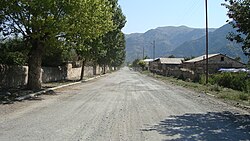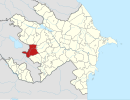This is an old revision of this page, as edited by Yobot (talk | contribs) at 11:16, 6 January 2015 (→Lakes, rivers, mountains and zones: Removed invisible unicode characters + other fixes, removed: (3) using AWB (10691)). The present address (URL) is a permanent link to this revision, which may differ significantly from the current revision.
Revision as of 11:16, 6 January 2015 by Yobot (talk | contribs) (→Lakes, rivers, mountains and zones: Removed invisible unicode characters + other fixes, removed: (3) using AWB (10691))(diff) ← Previous revision | Latest revision (diff) | Newer revision → (diff) Place| Kəlbəcər (Kalbajar) Քարվաճառ (Karvachar) | |
|---|---|
 | |
 Coat of arms Coat of arms | |
| Country | De facto De jure |
| NKR region Azerbaijani district | Shahumyan Region Kalbajar District |
| Elevation | 1,584 m (5,197 ft) |
| Population | |
| • Total | 500 |
| Time zone | UTC+4 (AZT) |
Kalbajar (Template:Lang-az, also spelled as Kelbajar, Kälbäjär, Kelbadzhar, Kelbadshar, Kelbadjar, Kelbadžar; Karvachar (Template:Lang-hy Karvachar) is the administrative center of the Shahumyan Region of the Nagorno-Karabakh Republic. De jure, it is the administrative center of Kalbajar District of Azerbaijan; but the city along with the associated rayon is under the control of the unrecognized Nagorno-Karabakh Republic after it was captured by Armenian forces during the Battle of Kalbajar, near the end of the Nagorno-Karabakh War.
Nagorno-Karabakh War
Armenian and Karabakh forces conquered Kalbajar the Nagorno-Karabakh War, due to its strategic location between the former Nagorno-Karabakh Autonomous Oblast and Armenia. Human Rights Watch findings concluded that during the Kelbajar offensive both sides violated rules of wars, including indiscriminate fire, and the taking of hostages." This capture was condemned by the UN Security Council.
Lakes, rivers, mountains and zones
There are 13 lakes in local plains and mountains.
Kalbajar’s longest river is the Tartarchay. Its tributaries are the Tutkhun, Lev, Zaylik, Alolar, Garaarkhaj (Sarkar) rivers.
There are also 20 well-known water springs.
70-80 per cent of the district is made up of mountains and each of them has a name. Since motor traffic in mountains is limited, local people have divided the district in different zones:
- 1. Upper zone – territories stretching from the center westwards
- 2. Ayrim zone – north-west
- 3. Gamishli-Lev zone – north-east
- 4. Tutgu zone – area around Zulfugarli- Baslibel
- 5. Sarsang SES zone – forests in the east
- 6. The Dalidagh-Sariyer-Keyti zone consists of bare mountains and plains
Gallery
-
Sign at northern site of the city with Armenian text: "Karvachar is an Armenian fortress"
-
Children playing soccer in the city
-
Other city street
-
 Dadivank Armenian monastery (9th–13th centuries), located 22 km west of Karvachar
Dadivank Armenian monastery (9th–13th centuries), located 22 km west of Karvachar
References
- ^ "Resolution 822 (1993) adopted by the United Nations' Security Council at its 3205th meeting". UNHCR Refworld. April 30, 1993. Retrieved 22 February 2011.
Noting with alarm the escalation in armed hostilities and, in particular, the latest invasion of the Kelbadjar District of the Republic of Azerbaijan by local Armenian forces
- The Nagorno-Karabakh Conflict: A Legal Analysis. Heiko Krüger. Springer, 2010. ISBN 3642117872, 9783642117879. p. 102
- Azerbaijan: Seven years of conflict in Nagorno-Karabakh By Human Rights Watch/Helsinki (Organization : U.S.) p.13
External links
- Kalbajar at GEOnet Names Server
- World Gazetteer: Azerbaijan – World-Gazetteer.com
- Template:ADG
| Administrative divisions of Artsakh | ||
|---|---|---|
| Capital city | ||
| Provinces | ||
| Provincial capitals | ||
| Other urban communities |
| |
